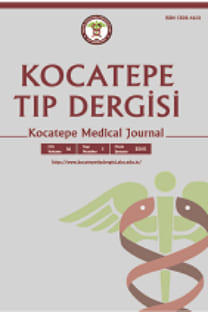TRANSPLANT HEKİMLERİNİN KORKULU RÜYASI: KEMİK İLİĞİ VERİCİ ADAYLARININ DONASYONDAN VAZGEÇMESİ
A NIGHTMARE FOR TRANSPLANT PHYSICIANS: BONE MARROW DONOR CANDIDATES WITHDRAWING FROM THE DONATION PROCESS
___
- 1. Hazzazi AA, Ageeli MH, Alfaqih AM, et al. Knowledge and attitude towards hematopoietic stem cell transplantation among medical students at Jazan University, Saudi Arabia. Saudi Medical Journal. 2019;40:1045-51.
- 2. Riezzo I, Pascale N, La Russa R, et al. Donor selection for allogenic hemopoietic stem cell transplantation: clinical and ethical considerations. Stem cells international. 2017;2017;5250790.
- 3. Feve F, Cambon-Thomsen A, Eliaou J, et al. Economic evaluation of the organization of a registry of haematopoietic stem cell donors. Revue D'epidemiologie et de Sante Publique. 2007;55:275-84.
- 4. Karakuş V. TÜRKKÖK Projesi Son Durum ve Etik Gerekçeleri. 2017.
- 5. Chen S H, Wang T F, Yang K L. Hematopoietic stem cell donation. International Journal of Hematology. 2013;97:446-55.
- 6. Krantz MJ, Coronel SM, Whitley EM, et al. Effectiveness of a community health worker cardiovascular risk reduction program in public health and health care settings. American Journal of Public Health. 2013;103:19-27.
- 7. Sanner MA. Registered bone marrow donors’ views on bodily donations. Bone marrow transplantation. 1997;19:67-76.
- 8. Mc Cullough J, Rogers G, Dahl R, et al. Development and operation of a program to obtain volunteer bone marrow donors unrelated to the patient. Transfusion. 1986;26:315-23.
- 9. Switzer GE, Myaskovsky L, Goycoolea JM, et al. Factors associated with ambivalence about bone marrow donation among newly recruited unrelated potential donors. Transplantation. 2003;75:1517-23.
- 10. Galanis P, Sparos L, Katostaras T, et al. Factors that influence Greeks' decision to register as potential bone marrow donors. Transplantation proceedings: Elsevier, 2008.
- 11. Onitilo A, Lin Y, Okonofua E, et al. Race, education, and knowledge of bone marrow registry: indicators of willingness to donate bone marrow among African Americans and Caucasians. Transplantation proceedings: Elsevier, 2004.
- 12. Aurelio M, Aniasi A, Haworth S, et al. Analysis of the motivation for hematopoietic stem cell donation. Transplantation proceedings: Elsevier, 2011.
- 13. Aschan J. Allogeneic haematopoietic stem cell transplantation: current status and future outlook. British medical bulletin. 2006;77:23-36.
- 14. Passweg J, Baldomero H, Gratwohl A, et al. The EBMT activity survey: 1990–2010. Bone marrow transplantation. 2012;47:906-23.
- 15. Kaya Z, Gültekin KE, Demirtaş OK, et al. Effects of targeted education for first-year university students on knowledge and attitudes about stem cell transplantation and donation. Experimental and Clinical Transplantation. 2015;13: 76-81.
- 16. Bagcivan G, Ozen N, Bayrak D, et al. Does Being A Cancer Patient or Family Caregiver of A Cancer Patient Affect Stem Cell Donation Awareness? Asia-Pacific Journal of Oncology Nursing. 2020;7:36.
- 17. Narayanan P, Wolanskyj A, Ehlers SL, et al. Medical students' knowledge, familiarity, and attitudes towards hematopoietic stem cell donation: Stem cell donation behaviors. Biology of Blood and Marrow Transplantation. 2016;22:1710-16.
- 18. Suluhan D, Eker İ, Yıldız D, et al. Kan bağışçısı gönüllülerin hematopoetik kök hücre donorü olma konusundaki bilgi, tutum ve motivasyonlarının belirlenmesi. TAF Prev Med Bull. 2016;15:512-15.
- 19. Laver JH, Hulsey TC, Jones JP, et al. Assessment of barriers to bone marrow donation by unrelated African-American potential donors. Biology of Blood and Marrow Transplantation. 2001;7:45-8.
- 20. Kwok J, Leung E, Wong W, et al. Factors Influencing Hematopoietic Stem Cell Donation Intention in Hong Kong: A Web-Based Survey. Annals of transplantation. 2015;20:604-13.
- 21. Bosi A, Bartolozzi B. Safety of bone marrow stem cell donation: a review. Transplantation proceedings: Elsevier, 2010.
- 22. Lacetera N, Macis M, Stith SS. Removing financial barriers to organ and bone marrow donation: The effect of leave and tax legislation in the US. Journal of Health Economics. 2014;33:43-56.
- 23. Kim M, Shin M. Effect of educational program on knowledge, attitude, and willingness of nursing students for hematopoietic stem-cell donation. International Journal of Environmental Research and Public Health. 2019;16:3696.
- ISSN: 1302-4612
- Yayın Aralığı: Yılda 4 Sayı
- Başlangıç: 1999
“COVID-19 İÇİN EVDE KAL” HAYATININ ÖĞRENCİLERİN KAYGI DÜZEYLERİ VE YEME DAVRANIŞLARINA ETKİSİ
Zehra İNCEDAL SONKAYA, Elçin BALCI, Serap İNCEDAL IRGAT
Hatice UYGUN, Sibel YAVUZ, Nurettin ERDEM, Saniye Başak OKTAY, Mehmet TURĞUT
CORYNEBACTERİUM TUBERCULOSTEARİCUM’A BAĞLI GELİŞEN SPONDİLODİSKİTİS OLGUSU
Duru MISTANOĞLU, Pınar KORKMAZ, Mehmet Bulent ONAL, Şahinde ATLANOĞLU
HASTANEMİZDEKİ SARS CORONAVİRUS - 2 AŞI ÇALIŞMALARININ DEĞERLENDİRİLMESİ
Derya KORKMAZ, Petek KONYA, Havva TÜNAY, Gamze ÇOLAK, Oğuzhan DİLEK, Nurhan DOGAN, Neşe DEMİRTÜRK
Gülseren EVİRGEN ŞAHİN, Erhun KASIRGA, Semin AYHAN
İDAME HEMODİYALİZ HASTALARINDA ORTALAMA TROMBOSİT HACMİ'NİN MORTALİTE ÜZERİNE ETKİSİ
TIP FAKÜLTESİ ÖĞRENCİLERİNDE SİBERKONDRİA, SAĞLIK ANKSİYETESİ VE İNTERNET BAĞIMLILIĞI DÜZEYLERİ
PREEKLAMPSİ PATOFİZYOLOJİSİNDE ROL OYNAYAN MOLEKÜLER YOLAKLAR
TRANSPLANT HEKİMLERİNİN KORKULU RÜYASI: KEMİK İLİĞİ VERİCİ ADAYLARININ DONASYONDAN VAZGEÇMESİ
İbrahim EKER, Yeter DÜZENLİ KAR, Nilgün EROĞLU, Özge VURAL, Kadriye AVCI, Görkem GÜLGÜN, Ali ARAN, Yasin Akif GÜL, Ahmet Oğuz TUĞCU, Gökçenur IŞIK, Raşit HOŞGEL
